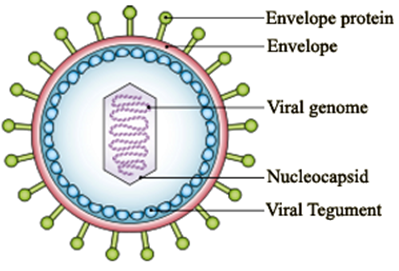What is the full form of EBVEBV: Epstein - Barr virusEBV stands for Epstein - Barr virus. It is a virus that belongs to the herpes virus family. It is also known as human herpesvirus (HHV-4). EBV is the prime cause of infectious mononucleosis. It also causes certain types of cancers, like Hodgkin's lymphoma, Burkitt's lymphoma, gastric cancer, and nasopharyngeal carcinoma. 
This virus mainly spreads through saliva, e.g., when you kiss an infected person, drink water using an infected person's glass or use his or her toothbrush. So, it is also referred to as kissing disease. It is also found in blood and semen, so there are chances that it may spread through blood transfusion, sex or organ transplant. EBV is around 122-180 nm in diameter. It has a double helix of DNA which contains around 172,000 base pairs and 85 genes. The DNA is surrounded by nucleocapsid, which in turn is surrounded by tegument. The tegument is surrounded by an envelope containing both lipids and glycoproteins in the form of surface projections which infect the host cells. An EBV test, which is a blood test and also known as "EBV antibodies", is conducted to identify an EBV infection. This test detects the antibodies produced against EBV antigens. Common SymptomsThe Symptoms may take 4 to 6 weeks to appear after the EBV infection. Some of the common symptoms are as follows:
Is the Epstein-Barr virus spreadable?Yes, the Epstein-Barr virus spreads easily. The interval between being exposed to the virus and the onset of symptoms, known as the incubation phase, is when the virus can spread. The virus may transmit by other bodily fluids as well as spitting, although spitting is the most common means for it to do so. You can get EBV by sneezing or coughing on an infected individual.
Even if you don't experience any symptoms, if you have EBV, you can still spread the infection to another person. Once you contract the infection, it will remain dormant (sleeping or inactive) in your body. EBV can awaken (reactivate) in response to specific circumstances, become contagious, and possibly manifest symptoms in the host. Events like
How does the Epstein-Barr virus affect my body's reaction?The virus binds to lymphocyte B cells, which are white blood cells in your body. White blood cells assist in preventing infection. Your white blood cells can't effectively fight the infection when the virus adheres to them, which causes symptoms. What are the Epstein-Barr virus symptoms?The degree of a person's symptoms varies depending on whether they have been diagnosed with the Epstein-Barr virus. Among the signs include a sore throat and inflammation of the throat (swelling).
When children have the Epstein-Barr virus, their symptoms are either non-existent or resemble those of transient diseases like the flu or a cold. Adults or teenagers who contract the virus may have symptoms in two to four weeks, although certain symptoms, particularly exhaustion, may last for months. Do Epstein-Barr virus symptoms reactivate?Once you've contracted the Epstein-Barr virus, the illness becomes dormant or latent. If your immune system is compromised, the infection may awaken (reactivate). Even when the virus does not manifest symptoms in the host, it might nevertheless spread to other people. How may the Epstein-Barr virus be avoided?Although there is no vaccination for the Epstein-Barr virus, you can take precautions to avoid contracting the disease by:
The Epstein-Barr virus: how is it identified?Because the symptoms of the Epstein-Barr virus are similar to those of other common infections, it might be difficult for your healthcare professional to make the diagnosis. Your doctor will ask you about your symptoms, how long you have had them, and whether you have been in touch with anyone who may have the virus. A blood test may be recommended by your doctor to verify the diagnosis. What procedures identify the Epstein-Barr virus?To confirm your diagnosis, your doctor will perform a blood test known as an Epstein-Barr virus antibody test. Your blood is sampled for this test, which looks for antibodies that lead to EBV. Since antibodies might not manifest themselves early in your diagnosis, your doctor might need to repeat the test between 10 days and two weeks following the initial test. What is the Epstein-Barr virus cure?The symptoms of the illness are addressed in order to treat the Epstein-Barr virus. Doing the following actions is advised:
It's critical to get adequate sleep to avoid symptoms growing worse. If the infection causes your spleen to grow, it is extremely crucial that you refrain from engaging in strenuous physical activity that might result in a burst spleen. How soon after therapy will I feel better?Epstein-Barr virus patients who exhibit symptoms often recover within two to four weeks. Some may have lethargy that persists weeks or even months after their first illness, making them feel exhausted. Is the Epstein-Barr virus curable?The Epstein-Barr virus cannot be treated, and there is no vaccination to stop it from spreading. Within two to four weeks, symptoms should disappear when the virus's symptoms are treated. The virus enters your body after infection and stays there in a latent (sleeping) condition, where it might reactivate and awaken if your body stimulates it through stress or a compromised immune system. If your body reactivates the infection, you may suffer symptoms once more.
Next TopicFull Form
|
 For Videos Join Our Youtube Channel: Join Now
For Videos Join Our Youtube Channel: Join Now
Feedback
- Send your Feedback to [email protected]
Help Others, Please Share










